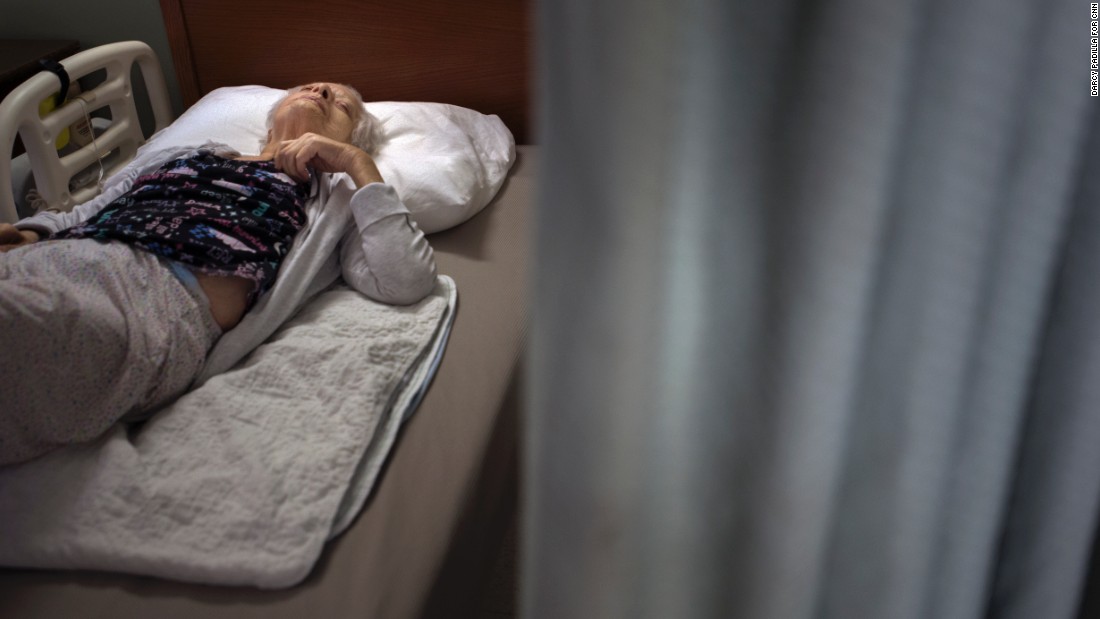The
maker of a little red pill intended to treat a rare condition is raking
in hundreds of millions of dollars a year as it aggressively targets
frail and elderly nursing home residents for whom the drug may be
unnecessary or even unsafe, a CNN investigation has found.
And much of the money is coming straight from the federal government.
The
pill, called Nuedexta, is approved to treat a disorder marked by sudden
and uncontrollable laughing or crying -- known as pseudobulbar affect,
or PBA. This condition afflicts less than 1% of all Americans, based on a calculation using the drugmaker's own figures, and it is most commonly associated with people who have multiple sclerosis (MS) or ALS, also known as Lou Gehrig's disease.
Nuedexta's
financial success, however, is being propelled by a sales force focused
on expanding the drug's use among elderly patients suffering from
dementia and Alzheimer's disease, and high-volume prescribing and
advocacy efforts by doctors receiving payments from the company, CNN
found.
Since
2012, more than half of all Nuedexta pills have gone to long-term care
facilities. The number of pills rose to roughly 14 million in 2016, a
jump of nearly 400% in just four years, according to data obtained from
QuintilesIMS, which tracks pharmaceutical sales. Total sales of Nuedexta
reached almost $300 million that year.
Nuedexta is being increasingly prescribed in nursing homes even though drugmaker Avanir Pharmaceuticals acknowledges in prescribing information
that the drug has not been extensively studied in elderly patients --
prompting critics to liken its use to an uncontrolled experiment. The
one study the company conducted solely
on patients with Alzheimer's (a type of dementia) had 194 subjects and
found that those on Nuedexta experienced falls at more than twice the
rate as those on a placebo.
Avanir declined repeated requests to be interviewed for this article. In an emailed statement,
the company said PBA is often "misunderstood" and that the condition
can affect people with dementia and other neurological disorders, which
are common among residents in long-term care facilities. A company
website states PBA can afflict up to roughly 40% of dementia patients --
a figure that is based on an Avanir-funded survey and was repeatedly
disputed by medical experts interviewed by CNN, including some of those
paid by Avanir.
Nuedexta is
approved by the Food and Drug Administration (FDA) to treat anyone with
PBA, including those with a variety of neurological conditions such as
dementia. But geriatric physicians, dementia researchers and other
medical experts told CNN that PBA is extremely rare in dementia
patients; several said it affects 5% or less. And state regulators have
found doctors inappropriately diagnosing nursing home residents with PBA
to justify using Nuedexta to treat patients whose confusion, agitation
and unruly behavior make them difficult to manage.
"There
has to be a diagnosis for every drug prescribed, and that diagnosis has
to be real ... it cannot be simply made up by a doctor," said Kathryn
Locatell, a geriatric physician who helps the California Department of
Justice investigate cases of elder abuse in nursing homes. "There is
little to no medical literature to support the drug's use in nursing
home residents (with dementia) -- the population apparently being
targeted."
CNN identified dozens
of cases across the country since 2013 in which state nursing home
inspectors questioned the use of Nuedexta.
In
a Los Angeles nursing home last year, regulators found that more than a
quarter of its residents -- 46 of 162 -- had been placed on Nuedexta,
noting that a facility psychiatrist had given a talk about the drug to
employees. This psychiatrist was a paid speaker for Avanir.
At
another facility in 2015, also in Southern California, an employee
admitted to inspectors that a resident had been given a diagnosis of PBA
to "somehow justify the use" of Nuedexta, even though its intended
purpose was to control the resident's "mood disturbances" and yelling
out.
And an Ohio doctor paid by
Avanir has come under government investigation for allegedly receiving
kickbacks for prescribing the drug and fraudulently diagnosing patients
with PBA in order to secure Medicare coverage -- though the doctor has
denied any wrongdoing.
The
federal government foots the bill for a big portion of the money being
spent on Nuedexta in the form of Medicare Part D prescription drug
funding, for people 65 and over and the disabled. In 2015, the most
recent year for which data is available, this Medicare program spent
$138 million on Nuedexta -- up more than 400% from just three years
earlier.
Medicare is supposed to
pay for drug uses that have been proven safe and effective for the
population they are intended to treat or that have been otherwise
supported by a specific collection of medical research. Nuedexta is
currently only approved by the FDA for patients who have PBA. So experts
say that Medicare coverage of the drug, which has been crucial to its
financial success, relies on the diagnosis of this single condition.
So-called "off-label" prescribing, in which doctors use the drug to
treat patients who have not been diagnosed with PBA, would typically not
be covered.
The Centers for Medicare & Medicaid Services (CMS) declined to comment on the growing use of Nuedexta in nursing homes.
Thousands
of the doctors prescribing Nuedexta have received money, or at least a
meal, from its maker -- a legal but controversial practice in the
industry. Between 2013 and 2016, Avanir and its parent company, Otsuka,
paid doctors nearly $14 million for Nuedexta-related consulting,
promotional speaking and other services, according to government data.
The companies also spent $4.6 million on travel and dining costs, both
for speakers and for doctors being targeted by salespeople.
A
CNN analysis also found that nearly half the Nuedexta claims filed with
Medicare in 2015 came from doctors who had received money or other
perks from the company (ranging from a few dollars' worth of food or
drink to hundreds of thousands of dollars in direct payments).
Pharmaceutical
companies are allowed to pay a doctor to promote a drug to colleagues
and other medical professionals. It is illegal, however, for doctors to
prescribe the drug in exchange for kickback payments from a
manufacturer. (Click to Continue)
Full Article & Source:
The little red pill being pushed on the elderly



2 comments:
They always have a new drug to give to the elderly to calm them down but really dopes them up into a stupor.
The nursing home industry is more powerful than people know. If they want to push the little red pill, they'll do it. And no one is going to stop them. Pray for our elderly.
Post a Comment